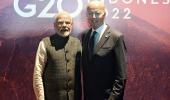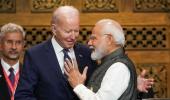'India matters significantly to President Biden and to this administration, and not just in South Asia or the Indo-Pacific region, but truly globally.'

"A State visit is not just about the red carpet and a terrific meal. It is about anchoring the relationship through a wide-ranging and very robust agenda of significant policy issues, and you are going to see that this week," says Admiral John Kirby, the US National Security Council coordinator for strategic communications.
The news briefing room at the Foreign Press Center in Washington, DC on Tuesday afternoon was packed to capacity with journalists from all over the world, a majority representing Indian news agencies. In the hour-long briefing Kirby spent only a few minutes in reading out his opening statement and took almost all the questions that was asked by the journalists present in the room.

Providing a preview of the agenda for the three-day State visit Kirby affirms, "This visit will affirm the deep and close partnership between the United States and India and the warm bonds of family and friendship that link Americans and Indians together."
"The visit will strengthen our two countries' shared commitment to a free, open, prosperous, and secure Indo-Pacific and our shared resolve to elevate our strategic technology partnership, including in defense, clean energy, and space," the admiral added.
The National Security Council coordinator reiterated the focus of the discussions being on five major areas: Global health, climate crisis, defense cooperation, emerging technologies including cyberspace and people to people ties.
"It's going to be the young people that are going to be the future leaders of both the countries, and so we want to make sure that we're investing properly in their growth, in their development, in their mutual understanding, and in the relationships that they will take forward into the future," Kirby stated.
"So there's going to be an awful lot on the agenda, but those are sort of the top five areas that I would cite," he said.
The only monosyllable response that Kirby gave was to the question on whether the main purpose of inviting Prime Minister Modi was to counter China's influence in the Indo-Pacific. The answer, a firm No from the admiral.
Answering a question about the shift of focus to India in South Asia and it becoming a partner for the future, Kirby explained, "India matters significantly to President Biden and to this administration, and not just in South Asia or the Indo-Pacific region, but truly globally."
He mentioned the repair work of relationships being done under the Biden administration. "Coming into office, President Biden saw that our relationships around the world in many cases, many places, were eroding, tattering, and trust and confidence in the United States as a partner, a friend, in some cases an ally, was beginning to fade."
"And he immediately set forth an assertive but cooperative foreign policy to revitalize those relationships," he added.
Vice President Kamala Harris, who will join the President and First Lady at the official welcome ceremony for Prime Minister Modi on Thursday, will be a full party to the State visit, Kirby said.
"I know she will be having opportunities, including a lunch that she'll be hosting for the prime minister and his staff to engage specifically and directly with the prime minister," he said.
There were a couple of questions raised about the concern for human rights and would President Biden discuss human rights issues in India as part of the conversations during the State visit.
"Some issues are always easier to talk about than others, but that's what partners do. You have those kinds of conversations."
"We don't shy away from addressing those concerns privately. We don't shy away from addressing those concerns publicly. And everywhere the President goes, where and when it's appropriate and when it's a significant issue, he raises those concerns. And again, I don't think that this week will be any exception to that."
The State visit extended to Prime Minister Modi is only the third by the Biden administration. From the US perspective, there has been a huge shift of focus from other nations in South Asia to now India becoming the center of attention and a long term partner. Why is the red carpet being rolled out for India?
"A State visit is not just about the red carpet and a terrific meal. It is about anchoring the relationship through a wide-ranging and very robust agenda of significant policy issues, and you're going to see that this week," Admiral Kirby asserted.
"Take a look at the way in which this bilateral relationship has improved in the last two-and-a-half years," Kirby said, adding, "And just as critically, take a look at where this relationship is going to be going in the next 10, 15 years and how vital this bilateral relationship will be not just to regional security but global security."










